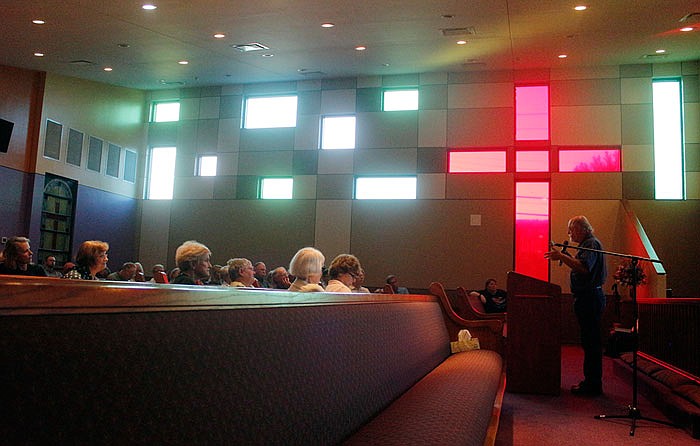Reviving the momentum to create nonviolent alternatives to dealing with differences between races.
That was the focus of a discussion Monday night at Quinn Chapel A.M.E. Church.
Pastor Michelle Scott-Huffman also is president of the Jefferson City chapter of "Faith Voices," which sponsored the event. They describe themselves as "a non-partisan, multi-faith, multi-racial grass roots organization committed to working toward racial equity and justice for all."
Much of the discussion Monday focused on what led to events earlier this month in Charlottesville, Virginia. KKK members, neo-Nazis and other right-wing groups protested the moving of a Confederate statue and clashed with counter-protesters. A car rammed into the crowd as authorities moved into disperse people, killing one person and injuring several others.
"We believe as people of faith that a lot of intolerance and ideas have been perpetuated by religious teachings and traditions, so it falls to the church that we take ourselves to another place," Huffman said. "We've spent much time focusing on race issues and there is much work to be done. I don't know if there are overt signs of what we saw in Charlottesville happening here, locally, but white nationalism is built into the foundation of our society. So we want to work to undo that."
Huffman said the chapter wants to be proactive, not reactive, on the issue.
"Looking at the photos from Charlottesville, I'd say we are missing the boat in what we are teaching about diversity and caring for each other," she said.
One of the speakers Monday night was Professor Larry Brown, of Columbia. For 30 years in public education, activism, and as a pastor, he's been working to let people know about the possibility of peaceful, nonviolent change. He was among faith leaders who briefed Jefferson City officials in 2008 prior to a neo-Nazi group march at the Capitol.
"The difference between that and Charlottesville was we told the people not to confront them, let them say their piece and go," Brown said. "They were far more prepared - compared to what happened in Charlottesville - and in the end no one was hurt.
"For nearly 25 years, I have studied the White Nationalist movement, particularly in our region, and have tried to monitor activity across the country as well," Brown added. "I have sought to understand their worldview, and have stressed and in some ways warned that mainstreaming racial hatred has been a significant goal for them. Now that we have opened the door, given them legitimacy and support, and put them in positions of leadership, we will have to deal with the most dramatic of consequences. It's the same old beliefs, but packaged differently."
Also speaking Monday night was Pastor Dave Gass from Pleasant Hill. He was among those rallying support for passage of an anti-racist resolution at this year's Southern Baptist Convention.
The resolution called on the denomination to denounce nationalism and "reject the retrograde ideologies, xenophobic biases, and racial bigotries of the so-called 'alt-right' that seek to subvert our government, destabilize society, and infect our political system."
While it appeared the resolution would fail to come to a vote, Gass and others worked to ensure it did. Ultimately, it passed.
"What we're seeing happen in the last year, and even more so in Chalottesville, is that white supremacy doesn't live behind glass in a civil rights museum," Gass said. "The path to hell is wide and lit with torches, and informed by favorite news sites, and many are finding it. The church will have credibility where she fights for diversity, stands up against oppression, loves the poor, and welcomes the immigrant. There is apathy in the evangelic world. We have to educate people, change mindsets and it has to start in the pulpits."
Huffman said they will continue to keep the dialogue about race ongoing.
"We could be talking about neighborhood meetings where we can get to a more personal level on how to deal with race issues," she said.

